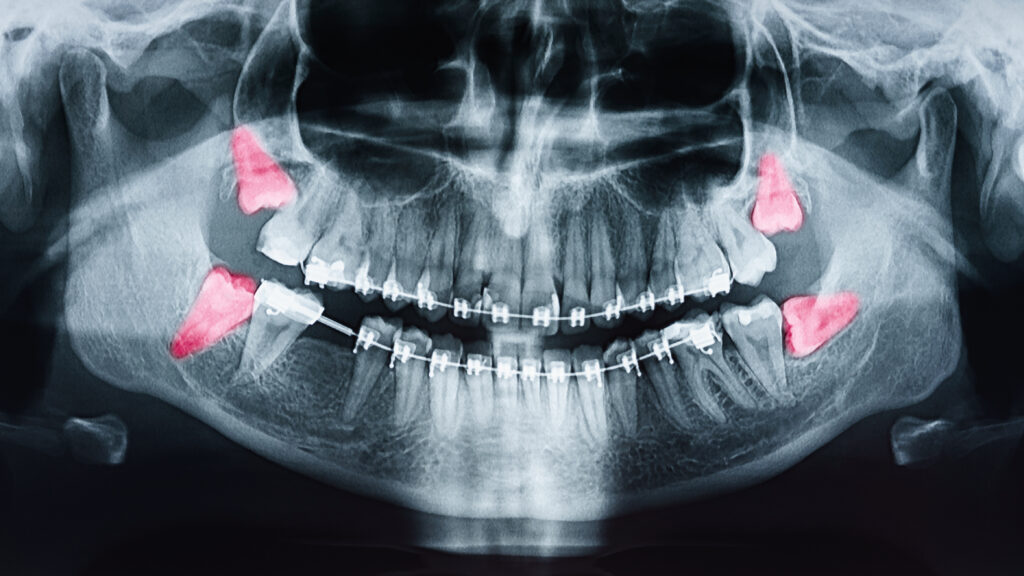(801) 212-9061
7555 Center View Ct Suite 104 West Jordan, UT 84084
Wisdom Teeth Removal in West Jordan

Wisdom teeth, also known as third molars, are the last set of teeth to develop, usually emerging in the late teens or early twenties. While some people never face issues with their wisdom teeth, for many, these teeth can cause problems, making removal necessary.
Schedule a free consultation at (801) 212-9061.
Wisdom Teeth Removal: Procedure and Considerations
Why Wisdom Teeth Removal is Necessary
- Impaction: Wisdom teeth often become impacted, meaning they cannot fully emerge through the gum line due to lack of space. This can lead to pain, swelling, and infection.
- Risk of Dental Issues: Impacted wisdom teeth can contribute to tooth decay, gum disease, and can disrupt the alignment of other teeth.
- Cysts or Tumors: In some cases, cysts or tumors can develop around impacted wisdom teeth, requiring prompt removal to prevent damage to the jawbone and other teeth.
The Removal Process
- Initial Examination: Includes X-rays or CT scans to assess the position and condition of the wisdom teeth.
- Sedation and Anesthesia: Depending on the complexity, the procedure may be performed under local anesthesia, sedation, or general anesthesia.
- Surgical Removal: The surgeon may need to make incisions in the gums and remove bone to extract the teeth. If necessary, teeth may be sectioned into smaller parts for easier removal.
- Stitches and Recovery: Stitches are usually applied to aid healing; dissolvable stitches are often used. Post-operative instructions are provided to ensure proper healing and to manage discomfort.
Post-Removal Care and Recovery
- Rest and Medication: Patients are advised to rest and may be prescribed pain medication or antibiotics.
- Diet and Oral Hygiene: Guidelines on diet (soft foods) and oral hygiene practices are provided to prevent infection and promote healing.
- Monitoring for Complications: Follow-up appointments are crucial to monitor healing and address any complications, such as dry socket or infection.

Common Misconceptions about Wisdom Teeth Removal
Misconception: Everyone Needs Their Wisdom Teeth Removed
Fact: Wisdom teeth removal is not universal. It’s necessary only when these teeth pose potential health risks or cause existing problems.
Misconception: Recovery from Wisdom Teeth Removal is Always Painful and Long
Fact: While some discomfort and swelling are normal, advancements in techniques and pain management have made recovery more comfortable and easier for many patients.
Misconception: Wisdom Teeth Removal Causes Facial Changes
Fact: Wisdom teeth removal does not cause any significant change in facial structure or appearance.
Wisdom teeth removal is a common dental procedure that can prevent various oral health issues and alleviate discomfort. Understanding the process, post-care, and addressing common misconceptions can help patients approach this treatment with confidence and clarity.
Experiencing issues with your wisdom teeth? Don’t wait for complications to develop. Call to schedule a Free comprehensive evaluation at (801) 212-9061.
Frequently Asked Questions
Wisdom teeth, also known as third molars, are the last set of teeth to develop. They typically emerge in your late teens or early twenties. Often, they’re removed because they can cause problems like impaction (teeth that are trapped beneath the gum line), misalignment of other teeth, pain, or infection. In some cases, they can also lead to cysts or tumors.
Indications for wisdom teeth removal include pain, infection, cysts, tumors, damage to neighboring teeth, and gum disease. Sometimes wisdom teeth are removed as a preventive measure if they’re likely to cause problems in the future. Regular dental check-ups and X-rays can help our dentist determine if they need to be removed.
Wisdom teeth are typically removed in the late teens or early twenties, as the roots are not fully developed and the recovery tends to be quicker. However, they can be removed at any age if they cause problems.
The procedure involves making an incision in the gum to expose the tooth and bone, removing any bone blocking access to the tooth root, dividing the tooth into sections if it’s easier to remove in pieces, removing the tooth, cleaning the site of the removed tooth, and stitching the wound closed to promote healing.
The procedure is usually performed under local anesthesia, sedation, or general anesthesia, so you shouldn’t feel pain during the extraction. Post-surgery, there may be some discomfort and swelling, but this can be managed with pain relief medications prescribed by our dentist.
After the procedure, you may experience swelling, mild pain, and bruising for a few days. It’s important to follow your dentist’s aftercare instructions, which may include taking medications, using a cold pack, eating soft foods, and avoiding strenuous activity for a short period.
Recovery typically takes a few days to a week. Most people can return to normal activities within a couple of days, but it can take up to two weeks for any soreness and swelling to subside completely.
As with any surgical procedure, there are risks involved, including dry socket, infection, damage to nearby teeth, or nerve damage. However, these complications are relatively rare, especially when the procedure is performed by an experienced dental professional.
It depends on the type of anesthesia used. With local anesthesia, you’ll be awake but won’t feel pain. With sedation or general anesthesia, you’ll be asleep during the procedure.
Post-operative care includes resting, avoiding vigorous mouth rinsing or touching the wound area, eating soft foods, and gradually reintroducing solid foods. Good oral hygiene is important, but be gentle around the surgical sites.
BOOKING HOURS
M 8AM–5PM | Tu 8AM–5PM | Wed 7AM–6PM | Th 8AM–5PM | Fr 8AM–5PM
We are OPEN for ALL dental care procedures and emergency needs. Protecting the health and safety of our patients, families, and team members remains our number one priority.
Free $50 Gift Card*
$50 Gift Card when you complete an appointment with us!
*Redeemable after completed paid treatment. Must be a new patient to our organization and must not have been seen in ANY OF OUR LOCATIONS. The patient will receive a gift card via email or SMS after completion of their appt.
Free Exam & X-ray^
For New Patients without insurance we offer Free Exam and X-rays!
^For New Patients that do not have dental insurance. New patients must be 18 or older to receive free exam and x-rays. Discounts cannot be combined with other offers or dental discount plans. Additional fees may be included in individual cases.
$99 Hygiene Visit^^
For New Patients without insurance we offer Free Exam and X-rays!
^^For new patients without dental insurance. Includes Exam, X-Ray and Routine Cleaning. A Periodontal Cleaning requires additional fees, and rescheduled for further treatment. Cannot be combined with other offers or dental discount plans.

